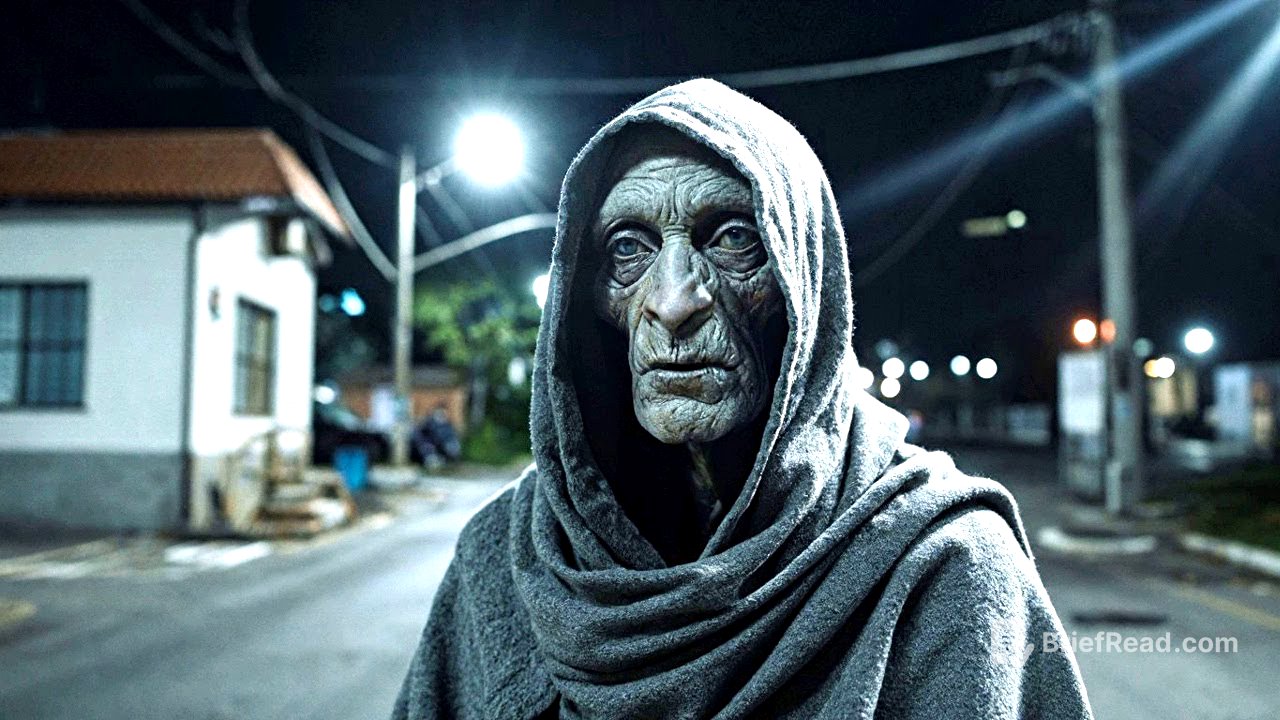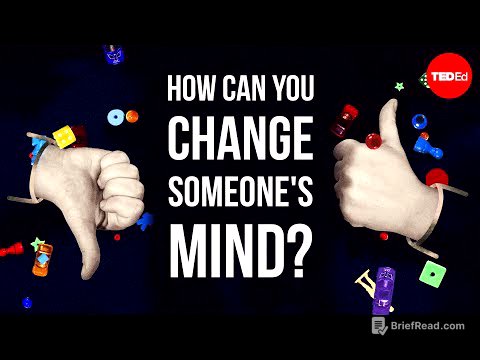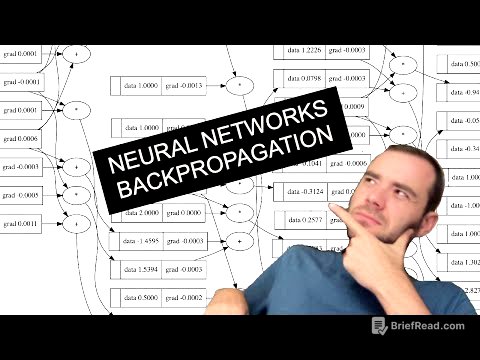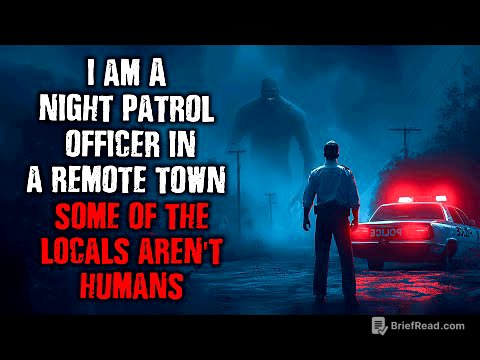TLDR;
The video presents a thought-provoking encounter between a young mathematician and a homeless man who claims to be the Wandering Jew, cursed for denying Jesus rest on his way to crucifixion. The film explores themes of faith, reason, immortality, and the meaning of life, challenging the protagonist's rational worldview and prompting him to question his beliefs. The story culminates in a surreal twist, leaving the audience to ponder the nature of reality and the human condition.
- A young mathematician encounters a homeless man claiming to be the Wandering Jew.
- The film explores themes of faith, reason, immortality, and the meaning of life.
- The protagonist's rational worldview is challenged, leading him to question his beliefs.
- The story culminates in a surreal twist, leaving the audience to ponder the nature of reality and the human condition.
The Supermarket Encounter [0:00]
A young man, seemingly henpecked, is on the phone with his wife while shopping for groceries. He attempts to explain away his recent PlayStation purchase and a business trip involving a female colleague, but his efforts are futile. At the checkout, a homeless man is short 10 rubles and asks for help from those in line, invoking the idea of judgment day and good deeds. A woman provides the needed coin, but the homeless man repays her with his own money, returning the coin and telling the young man it will come in handy when he remembers this moment in hell.
The Parking Lot Conversation [1:19]
The young man exits the supermarket and encounters the same homeless man sitting on the curb. He returns the 10-ruble coin, but the man questions his faith and beliefs. The young man, a mathematician, asserts his belief in facts, leading the homeless man to mock his materialistic worldview and inevitable fate as "worm food." This sparks a debate about the meaning of life, with the homeless man claiming the young man is already "worm food" due to his lack of interest in anything meaningful.
Proof of God [2:42]
The conversation becomes more intense as the young man challenges the homeless man's lifestyle and asks about his meaning of life. The homeless man claims there is undeniable proof of God's existence, but it's impossible to convince someone who refuses to believe. He then makes a startling claim that he and the young man have met before, unsettling the young man. The homeless man's cryptic remarks and the young man's skepticism create a tense atmosphere.
The Revelation [3:49]
The young man insults the homeless man, calling him a loafer, which triggers an outburst. The homeless man grabs him, yelling about the endless wait he has endured. He then breaks down in tears, lamenting that the young man doesn't understand how long he's been waiting. As the young man tries to comfort him, the homeless man reveals that he has met Jesus Christ. He claims to be the Wandering Jew, cursed for not allowing Jesus to rest on his way to crucifixion.
The Wandering Jew's Tale [6:19]
The homeless man recounts the story of how he denied Jesus rest, leading to the curse of immortality. He explains that for him, God's existence is not a belief but a fact. The young man, intrigued, challenges him to prove his story. He asks how many fingers he's holding up behind his back, but the homeless man replies that he has seen Jesus Christ, not his fingers. He admits he has no way to prove his identity, as any relic from that time would be impossible to verify.
Questions of Faith and Immortality [7:31]
The young man presses the homeless man for details about God, something humanity doesn't know. The man says that Jesus was just an ordinary, tired person, and he doesn't even remember his face. He recounts the event of denying Jesus rest, explaining that he didn't believe Jesus was the son of God and feared helping a condemned man. The young man offers money if the homeless man admits he's lying, but then asks if he feels ashamed of his actions. The man admits he has pondered it for centuries and even served as a clergyman to atone, but to no avail.
The Burden of Immortality [9:25]
The homeless man describes the downsides of immortality: the constant need for food and warmth, the endless waiting, and the feeling of being disconnected from the ever-changing world. He reveals that he has tried to end his life multiple times, but his immortality prevents it. He recounts failed suicide attempts, including hanging and a self-inflicted gunshot wound. The young man is astonished by the man's age and experiences.
The Paradoxes of Belief [11:35]
The young man continues to question the homeless man's story, suggesting he might be schizophrenic or part of a prank. The homeless man argues that if he were making it up, he would have chosen a more believable story. He points out that he knows the line between sanity and madness. He admits that he has wondered if he went mad, but the decades passed and he stayed the same. He needs the young man's help to figure things out together.
The Thought Experiment [12:53]
The young man proposes a thought experiment: what if he were to shoot the homeless man? The man surprisingly agrees, but the young man refuses, not wanting to explain the situation to the police. He asks for a historical fact, but the homeless man can't recall anything extraordinary. He explains that he has forgotten much of his past, just as the young man can't remember what he did last August. He has lived in many countries but has no proof of his travels.
The Meaning of Life and the Nature of Humanity [14:04]
The homeless man wonders why he and the young man started talking. He discusses space and the lack of alien life, pondering if the universe is just a backdrop for lifeless planets. He reflects on how he has gone from a shepherd to a bum over 2,000 years. The young man questions why Jesus would curse someone, but the homeless man believes he cursed himself with his own words. He concludes that the real curse is remaining a stupid shepherd, never discovering any secrets or inventing anything remarkable.
The Timelessness of Human Nature [15:39]
The young man asks the homeless man to share insights from the past, but the man insists that people have always thought the same things. He believes God has a shape, the shape of human imagination, and that people always have a choice, even within fate. The young man wonders if believers aren't fools, but then questions the existence of fanatics. The homeless man explains that people are inherently prone to comparing their beliefs to others, leading to conflict.
The Parting [16:53]
The young man's wife calls, and he realizes how long he's been talking to the homeless man. The homeless man advises him to stand up to his wife and asks about her worldview. The young man realizes that disproving God's existence is as hard as proving it. The homeless man says that if a person is happy, they shouldn't question it, as faith brings happiness. He confesses that he lives like someone preparing for a big exam, with time stretching endlessly and youth flying by.
The Paradox of Eternal Life [18:10]
The young man suspects the homeless man was playing him. He theorizes about eternal youth, but the man denies being special. He recounts his experiences during the war and the Holocaust, stating that people don't change, even as the world does. He calls it a paradox of the mind. God in the head can't move a stone that's also in the head, but he'll do it when the time is right. The man admits he also wants to know what a human being is for, what happens after death, and what we must achieve in this life.
The Idea of Humanity [19:26]
The young man wonders why the homeless man told him all this. The man suggests a thought: what would you do if you lived a thousand years? He'd do exactly what he does now, just for a thousand years. He says that if humans are God's creations, life must have meaning, but he doesn't know what it is. He's never met anyone who truly fulfilled their potential. He says that nearly every emotion boils down to either fear or love, and to enter heaven, they must choose God.
The Unexpected Twist [20:27]
The young man imagines the homeless man is God, but the man laughs, saying he's just human, carrying a spark of love. He doesn't know why fate left him alive, but maybe he has a mission. He sees versions of the same being in everyone. As the young man's wife arrives, another man appears, identical to the wanderer, and scolds him for skipping work. Stunned, the young man watches them leave while his wife drives away. He looks in the mirror and sees the wanderer staring back at him, leaving the audience to ponder the film's philosophical questions.









